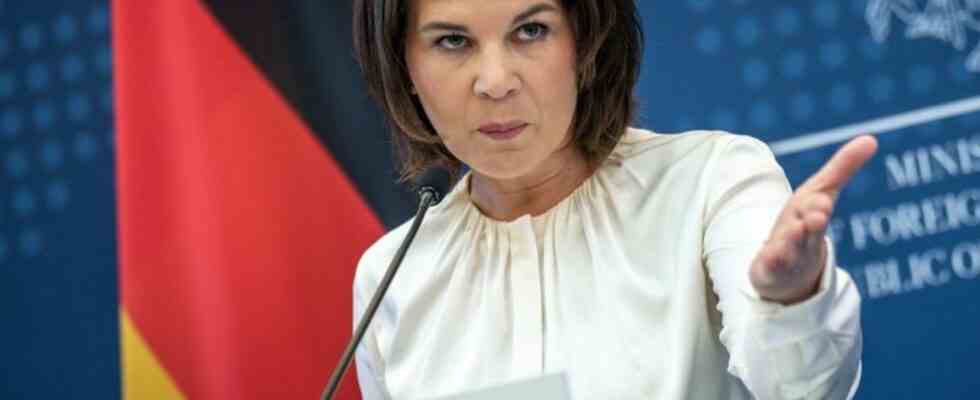NATO Eastern Flank
Baerbock: Lead the way with NATO reinforcements in the Baltic States
“I understood here that this is necessary”: Annalena Baerbock. Photo: Michael Kappeler/dpa
© dpa-infocom GmbH
For a long time there was distrust in the Baltic states as to whether Germany would be prepared to help in the event of a Russian attack. Foreign Minister Baerbock is sending a strong signal of solidarity.
Foreign Minister Annalena Baerbock has promised the Baltic States greater German involvement in the defense of NATO’s eastern flank.
“If NATO decides that NATO’s presence should be increased to brigade strength, then we as the Federal Republic of Germany will make a substantial contribution,” announced the Green politician on Friday after a meeting with her counterpart Gabrielius Landsbergis in the Lithuanian capital of Vilnius . “I understood here that this is necessary. And then Germany will lead the way there.”
A brigade usually consists of several thousand soldiers. Baerbock assured that Germany would participate in an increased long-term NATO presence in the Baltic States with additional contributions.
Baerbock: No lip service
NATO wants to decide on its new defense concept at a summit meeting in Madrid at the end of June. Baerbock said that “not just lip service” was needed at the summit. In view of the brutal Russian action in Ukraine, “air defense and a substantial NATO presence” are necessary. “We must be able to practically defend every square inch of our common alliance territory, that is, the Baltic States. From the very first minute, »said the minister.
After repeated attempts to achieve common security in Europe with Russia as a partner, Russian President Vladimir Putin is now forcing NATO to take a new course, Baerbock said. “Today, the primary concern is security against Russia” and the question of “we as an alliance position ourselves against Russia in the medium and long term.”
Minister: Tripwire logic failed
Baerbock said that NATO’s previous “trip wire logic” for defending the Baltic States was no longer sufficient. According to this logic, in the worst case scenario, the Baltic territory would be overrun by Russian troops, after which NATO would have to liberate the Baltic states again. After the Russian war crimes of Bucha and Mariupol in Ukraine, “this idea of liberation is no longer acceptable,” said the minister. If you have a border with Russia that is hundreds of kilometers long, “then there is no reaction time to wait for reinforcements”.
Landsbergis said the decisions of the Madrid NATO summit must reflect that the security environment has changed fundamentally as a result of Russian actions. “NATO must be ready to defend the Baltic States from the first minute of the conflict.” This would require the stationing of more NATO soldiers in the Baltic states. Addressing Baerbock, he added: “We are grateful to Germany for the additional soldiers who were sent here after the outbreak of the Russian war. But to really defend every square inch, more serious units are needed.”
Baltic states for stronger NATO presence
The heads of government of Latvia, Estonia and Lithuania advocated stronger NATO assistance. “We are not only demanding a permanent NATO presence, but a new kind of NATO presence,” said host Krisjanis Karins after a meeting with Kajas Kallas (Estonia) and Ingrida Simonyte (Lithuania). This new presence must be based on the premise that an invasion will not take place “because our ability to defend ourselves and achieve victory would be clear from day one”,
At the same time, the three EU and NATO countries referred to their own efforts to increase their defense capabilities. “All three of us independently, but as it turned out together, decided to increase our defense spending to 2.5 percent of gross domestic product,” Karins said. Latvia and Estonia want to achieve this by 2025, Lithuania a little later.
Baerbock thanks German soldiers
During a visit to the German-led multinational NATO battle group in Rukla, Lithuania, Baerbock said: “Not only is the security of the Baltic states guaranteed here, but European security is guaranteed here.” If Germany is to show a stronger presence on NATO’s northern flank in the future, “we must also guarantee that the logistics, the infrastructure and, above all, the material for this will be made available”.
Baerbock had been informed about the work of the soldiers by the commander of the battalion, Lieutenant Colonel Daniel Andrä. Among other things, she was shown the light anti-aircraft system Ozelot, which was moved to the site just a few weeks ago. She inspected the inside of a Boxer wheeled medical armored vehicle.
Against the background of the Russian aggression against Ukraine, the multinational unit had been reinforced from around 1,200 to around 1,600 soldiers even before the start of the war by additional forces from Germany, Norway and other countries. With currently a good 1000 soldiers, the Bundeswehr has the largest contingent. Germany has led the “Enhanced Forward Presence Battle Group” (EFP), as the association is called in NATO jargon, since 2017. Soldiers from Belgium, France, Iceland, the Netherlands, Croatia, Norway and Luxembourg are also taking part in the battalion.

